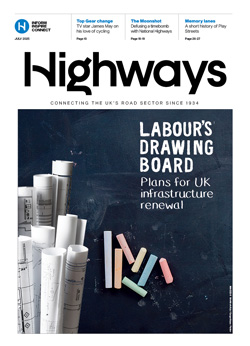Richard Croker and Jon Hart from award-winning infrastructure law firm Pinsent Masons LLP consider a major change coming down the line in relation to VAT, which could have significant ramifications for highways contractors and subcontractors alike.
As the popular saying has it, ‘in life nothing is certain, except death and taxes’. To which can be added ‘changes to tax legislation’.
Amid headlines around poor performance of materials in 30 degree heat and the shape of the post-Brexit supply chain, many highways stakeholders may have missed the Government’s announcement of a VAT domestic reverse charge for building and construction services. This is due to take effect from 1 October 2019. It may be one of the biggest tax changes in recent times for industry contractors and subcontractors, although for many perhaps its implications are only just starting to be considered.
What is a reverse charge and why do we need it?

The new reverse charge means that instead of suppliers collecting cash from their customers in respect of VAT and being liable to pay the VAT to HMRC, customers will pay the net of VAT amount (ie without the VAT)to the supplier and account for the VAT on their own VAT return.
It is important to note that what is changing is not the VAT liability itself, but the way in which the liability is accounted for.
The reverse charge aims to combat fraudulent practices in the construction sector when suppliers do not account to HMRC for VAT they have charged to their customers. This is serious stuff: HMRC has estimated that in the last financial year £100m of VAT was lost as a result of fraud.
The impact of the reverse charge on business should not be underestimated – up to 150,000 businesses are likely to be affected.
Changes will be needed to IT and accounting systems and staff training. At a time when retentions are already in the spotlight for main contractors with the Aldous Bill, there is likely to be a further negative impact on cash flows to be factored in.
Is the industry ready?
Apparently not. A recent survey suggests that over two-thirds of SMEs (69%) were not aware of the change and of those that were, only one-third was ready to implement the new system.
Current system
At the moment, suppliers of construction goods and services that are registered for VAT should charge customers for VAT and later account to HMRC for sums charged (usually on a quarterly basis). Suppliers hold money earmarked for HMRC for a short period before paying this over – which is where the fraud comes in. Unscrupulous suppliers can charge customers an amount purporting to be VAT but which is never accounted for to HMRC.
New system
A business that receives supplies subject to the reverse charge on or after 1 October 2019, must account to HMRC for the VAT rather than the supplier. The supplier should raise an invoice, which must specify that the reverse charge applies and that the recipient of the services must account to HMRC for this amount. The recipient should account for the reverse charge VAT as output tax on its own return and recover it as input tax, subject to the normal VAT recovery rules (for most transactions the VAT is simply netted off). With a few exceptions, the rule will be that the reverse charge will apply to the whole construction supply chain up to the point where the recipient receiving the supply is no longer a business that makes supplies of construction services itself (the ‘end-user’).
Which projects will be affected?

Whether the reverse charge applies to projects that have already commenced before 1 October, 2019 will depend on when the tax point is (i.e. the date of issue of the VAT invoice, or receipt of payment – whichever occurs first). If the tax point is on or after 1 October then the reverse charge will apply. If the tax point is before then, the current system should apply.
Some argue that this will further confuse matters and the reverse charge should only apply to projects commenced after 1 October 2019.
Where projects relate to framework agreements on which there are call-offs, then the position may be further complicated depending on the specific call-off arrangements. The reverse charge will only apply to projects involving:
- supplies of specific construction services (defined widely, and which would capture most typical activities on a highways project)
- one VAT registered business to another VAT registered business
- the standard or reduced rates of VAT and
- where payments are required to be reported through the existing Construction Industry Scheme for subbies (which, subject to conditions, enables the subcontractor to gross payments from main contractors, as a consequence of the main contractor making deductions from subcontractor payments and passing on to HMRC).
Grey areas
There are some areas of uncertainty as to how the reverse charge may be applied. These include questions around what supplies may be excluded and what happens where only part of a supply of services is caught by the reverse charge. For example, who is responsible for what is/is not excluded and should a ‘mixed’ supply of services be subject to the reverse charge as a whole, or can it broken down into separate elements?
There may be issues around who is an ‘end-user’ – for example, while a property developer that is intending to sell or lease a completed development will be treated as an end user initially, if his role changes because of a sale in the course of construction – e.g. a forward-funding transaction – he will cease to be the end-user part of the way through a project, forcing a VAT change on the parties.
In general terms, it is going to be the customer’s job to keep HMRC and its suppliers informed of what is going on. For finance providers to the industry these issues are probably going to be magnified and may require a more comprehensive review of the way in which invoices are treated. This needs to be an important consideration for stakeholders when it comes to considering how they engage with each other and HMRC.
Problems, problems, problems?
To prepare themselves for the implementation of the reverse charge, businesses are potentially going to need to incur costs as a result of changing accounting systems and training staff.
Those costs will vary depending on the size and complexity of the business. For this reason there have been calls (including from the Chartered Institute of Taxation and the Federation of Master Builders) for HMRC to introduce a long lead time and provide proper user-friendly guidance for implementing changes.
There must remain significant concerns that businesses will be charged VAT incorrectly, with suppliers being paid an amount purporting to be VAT when the reverse charge should have applied which cannot then be recovered as input tax. It should also be remembered that penalties are imposed for errors in VAT returns.
What does HMRC have to say?
In its June guidance note HMRC indicated that it will ‘apply a light touch in dealing with related errors that occur in the first six months of the new legislation, as long as you are trying to comply with the new legislation and have acted in good faith’.
So, is it enough to take comfort from this and hope for the best? Almost certainly not.
If you aren’t doing it already, then now is the time to address a range of practical issues, including:
- asking contractual employers to confirm whether the reverse charge applies (checking VAT and CIS registrations is the best starting point here)
- checking your construction agreements and subcontracts (a regular theme of this column)
- considering payment provisions and looking at what warranties (if any) might be given as to the status of recipients of services and provisions dealing with changes in the status
- checking forms of invoices and templates to ensure they comply with HMRC guidance (especially where there are self-billing arrangements)
- considering what (if any) steps can be taken to address potential effects on cashflow
- increasing awareness of the 1 October 2019 deadline by relevant accounts and management teams (…and reflecting on the fact that it is then only 30 more days until the Brexit deadline, under current Government plans)





